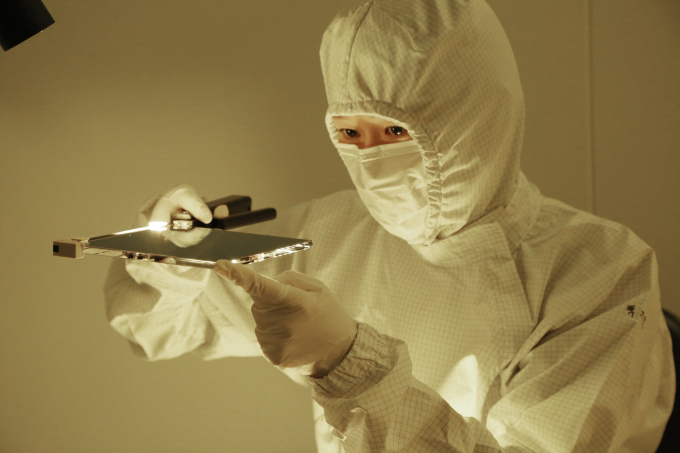Industrial materials
PI Advanced Materials emerges as high-tech golden goose
By Feb 15, 2021 (Gmt+09:00)
2
Min read
Most Read
LG Chem to sell water filter business to Glenwood PE for $692 million


Kyobo Life poised to buy Japan’s SBI Group-owned savings bank


KT&G eyes overseas M&A after rejecting activist fund's offer


StockX in merger talks with Naver’s online reseller Kream


Mirae Asset to be named Korea Post’s core real estate fund operator



Back in 2019, SKC Kolon PI, a maker of industrial film, was put up for sale as the company’s two largest owners thought the business’s global market was too small for conglomerates to run long term.
The joint venture between SKC Ltd. and Kolon Industries Inc. was the world’s No. 1 supplier of polyimide (PI), with its annual revenue hovering around a mere 200 billion won ($181 million), although the business eked out a decent operating profit margin of 20%.
Early last year, SKC and Kolon sold their respective 27% stakes in the polyimide film-making JV to Korean private equity firm Glenwood Private Equity for about 300 billion won each – not a bad deal, said industry officials at the time.
The JV was later renamed as PI Advanced Materials Co. and has since expanded business as demand for the basic material has grown rapidly, with applications ranging from smartphones and semiconductors to display panels and electric vehicles.
PI Advanced Materials saw its operating profit rise 79% to 60 billion won on revenue of 261.8 billion in 2020. The operating profit margin was 23%, a rare feat for a local manufacturer.
Even for the seasonally weak fourth-quarter alone, the company posted 16.8 billion won in operating profit, up 5.7% from the year-earlier period, boosted by the higher demand for PI films used in smartphones.
PI is an advanced high-performance industrial material that can withstand extreme temperatures from minus 269 to 400 degrees Celsius. The company manufactures PI films used in flexible printed circuit boards, heaters, transformers, motors, and gaskets.
More recently, the basic material is employed in electric vehicles in the form of PI varnish -- a flexible copper clad laminate -- for use in EV motors and battery packs as the material can withstand temperatures as high as 560 degrees Celsius.

WIDENING APPLICATIONS OF PI FILM
PI Advanced Materials has a plant with an annual capacity of 3,900 tons and if it’s run at full capacity, the company will be able to post an operating profit of 80 billion won on revenue of 320 billion won this year, according to industry officials.
The company plans to raise its capacity to 4,500 tons a year by 2022 to meet the rising demand for PI film. With the ramp-up, the company’s operating profit and revenue are forecast to rise to 100 billion won and 400 billion won, respectively.
Following the sell-off of its stake in the industrial film-making JV, SKC has advanced into the copper foil business, a key component of EV batteries.
SKC, the chemicals unit of SK Group, posted an operating profit of 52.9 billion won on revenue of 371.1 billion won from its copper foil business in 2020.
With the takeoff of electric cars globally, SK Nexilis Co., fully owned by SKC, plans to complete its fifth local plant by the end of 2021. It is also building its first overseas plant in Malaysia.
Meanwhile, Kolon Industries is enhancing its presence in the aramid market -- a ballistic protection material used in EV tires and 5G communication optical cables.
Write to Jae-Kwang Ahn at ahnjk@hankyung.com
In-Soo Nam edited this article.
More to Read
-
 EV battery materialsSKC to spend $600 mn to build copper foil plant in Malaysia
EV battery materialsSKC to spend $600 mn to build copper foil plant in MalaysiaJan 26, 2021 (Gmt+09:00)
2 Min read -

-
 EV battery materialsSKC to build first overseas copper foil plant in Malaysia
EV battery materialsSKC to build first overseas copper foil plant in MalaysiaDec 15, 2020 (Gmt+09:00)
3 Min read -
 Hydrogen economyKolon Industries to mass produce key material for fuel cells
Hydrogen economyKolon Industries to mass produce key material for fuel cellsNov 19, 2020 (Gmt+09:00)
2 Min read
Comment 0
LOG IN


